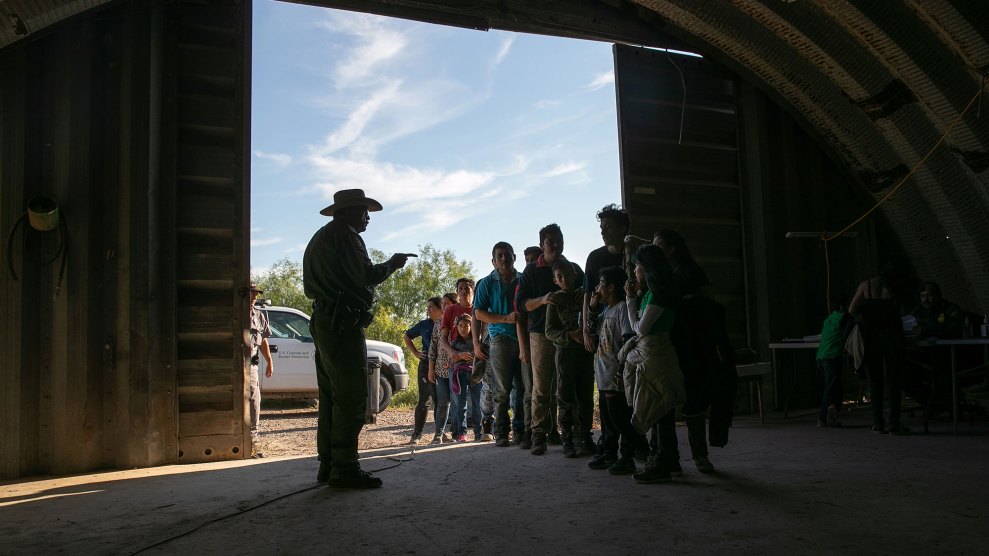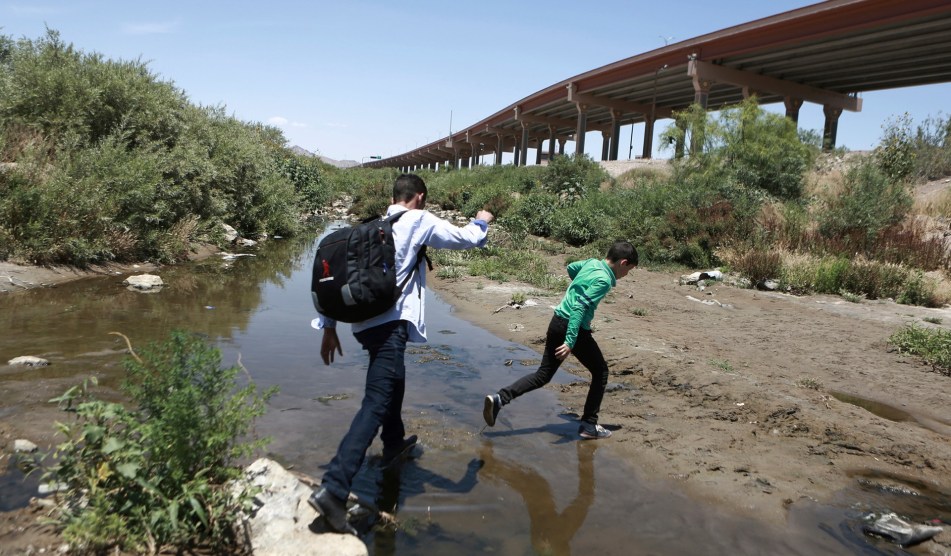
A Border Patrol agent in South Texas gives instructions to families, mostly from Central America, who had crossed the Rio Grande in September 2019.John Moore/Getty Images
Over the past couple of years, the Trump administration has been slowing chipping away at asylum seekers’ ability to seek refuge in the United States. With the advent of the coronavirus, Donald Trump and Stephen Miller finally had their chance to shut down the border indefinitely, ending asylum as we know it, at least through the 2020 election.
But on Wednesday, they proved that they won’t stop until the border is virtually sealed to asylum seekers in the future—COVID-19 or not. The Department of Homeland Security posted 161 pages of proposed regulations that, according to advocates and attorneys, include virtually everything the White House has wanted to do to gut asylum in the United States.
Before most of us could finish reading the dense, legalistic document, Aaron Reichlin-Melnick already had broken it down on Twitter, calling the “Kafkaesque” new rules a “sick joke.” So I called Reichlin-Melnick, policy counsel at the American Immigration Council, to make sense of what these proposed changes could mean for tens of thousands of people who are seeking refugee here. “The top line here is that the Trump administration is frustrated that it’s been losing in court on the definition of asylum,” he said. “So rather than accept that its definition is wrong, it wants to simply change the rules and declare itself the winner.”
The proposed changes would create brand new bars for asylum and redefine what asylum means. Essentially, Reichlin-Melnick said, the Trump administration is saying: “If we don’t get you one way, we’re going to get you another way. If we don’t get you a third way, we’ll get you a fourth way. Every single one of these things are overlapping tools to ensure that no one wins asylum.”
Here are some of the most egregious proposed rules that Reichlin-Melnick flagged:
- It bans immigration judges from approving asylum cases based on gender. “Say another country institutes the system from The Handmaid’s Tale,” he said. “Under these new rules, women would be barred from claiming asylum because they are women. Categorically barred. The rule says asylum will not be granted on the basis of gender.”
- It allows immigration judges to deny asylum before even seeing the person in a courtroom—and reject cases based solely on the information contained in the physical asylum application. “This is enormously problematic because many applications are filled out by people without lawyers,” he said. “They may not have full literacy, or speak English so someone else in a detention center filled it out for them. This would lead to a huge number of details solely because they couldn’t pay for a lawyer to dot every I and cross every T. The bad immigration judges would use it to just casually dismiss hundreds of claims from people they believe shouldn’t get asylum without ever giving them a chance to have a record.”
- It makes changes to how the United Nations Convention Against Torture is interpreted. “They would change the law so that even if you’re tortured by a government official in another country, so long as that government official wasn’t acting under color of the law or was a so-called rogue official, you wouldn’t qualify,” Reichlin-Melnick said. “So let’s say a mayor in a small town in Russia orders the local police to torture you, knowing that what he is doing violates Russian law: You would not be able to apply for protection from torture.”
- It significantly restricts asylum for victims of political persecution if it involves a nongovernment organization or a terrorist organization. “If you’re a Syrian who is persecuted by ISIS because you oppose them politically, you would not be able to claim asylum—as opposed to a Syrian who is being prosecuted because they are Christian,” he said. “They would not be affected by this change.”
- The proposed rules go beyond 2019’s so-called transit ban, which said any non-Mexicans traveling through Mexico were barred from asylum if they hadn’t applied first in Mexico. “This ruling redefines what it means to be ‘firmly resettled,'” he explains. “If you pass through a country and little known to you there’s an obscure provision in that country’s law that would’ve allowed you to stay there permanently, a judge could declare that you were firmly resettled in that country and are therefore banned from asylum.”
- It disqualifies any asylum seeker who may have two or more layovers in different countries on their way to the United States. “That’s simply arbitrary and capricious,” he said. “So you can fly Uganda-Nairobi-JFK, that’s fine, but if you do Uganda-Nairobi-Doha-JFK because you wanted a cheaper flight, then you’re banned from asylum.”
- It disqualifies anyone who failed to report income to the IRS or made a mistake in filing. “So that applies to anyone who got to the United States and worked off the books for a few months before you got your work permit,” Reichlin-Melnick said. “Or if you managed to get a lawyer who helped you get an ITIN (Individual Taxpayer Identification Number) and filed taxes but you were $20 off, you could be denied asylum just for that. Same with filing late.”
- It bans people who have been in the United States without status for one year or longer before applying for asylum. “Congress already spoke to that and put a rule into place that says there is a one-year filing deadline for applying for asylum, but there are exceptions to that rule,” he said. “Some people in some circumstances can apply after a year. Under this rule, Congress’ intent would be ignored. Things like that where Congress has directly spoken to the issue are patently illegal and would be struck down.”
- It doesn’t say the changes only apply to new applications, so it seems to affect people with pending cases, as well. “There are basic legal principals that say you generally can’t apply new regulations retrospectively,” he said, “but this rule refuses to even acknowledge that principle, and as a result judges could apply the rules to people who filed for asylum years ago.”
Many of these changes hinge on what it means to be a member of a “particular social group” when claiming persecution. But Reichlin-Melnick says that’s problematic because “particular social group” has no definition written into law, so “they are trying to overturn generations of law that define what it means to be a refugee to fit their narrow definition—which would exclude most people who currently win asylum in the United States.”
Starting Monday, there will be a 30-day comment period open for responses; by law, the government then has to review the comments before issuing the final rule. Reichlin-Melnick said it’s unlikely that we’ll see a final version of this rule anytime before the fall, and that it may not even be set in stone until after the election (a new president or a new Congress could overturn the rule). He said some of the “more blatantly illegal provisions” could be taken out between now and the final draft: “But the fact that they included those shows how little they’re concerned with following the law and how much they want to simply rewrite asylum law to do what they want.
“This really is death by a thousand cuts,” he added. “Or in the case of some of these bans, it’s death by a huge cut to the neck and then if you manage to survive that one, then it’s death by a thousand cuts.”
















